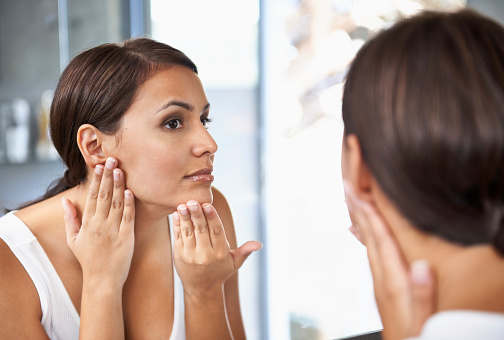First we should know the reasons for acne…..
Pimples can have a variety of causes, and some people may be more prone to developing them than others. Here are some common causes of pimples:
- Excess oil production: Pimples can form when your skin produces too much oil, which can clog your pores and trap bacteria and dead skin cells.

- Bacteria: Pimples are often caused by a buildup of bacteria on the skin, which can lead to inflammation and infection.
- Hormonal changes: Fluctuations in hormones, such as during puberty or menstruation, can cause an increase in oil production and lead to the development of pimples.
- Stress: High levels of stress can cause an increase in oil production, which can lead to the development of pimples.

- Poor diet: Eating a diet high in processed foods, sugar, and dairy products may increase your risk of developing pimples.

- Certain medications: Some medications, such as steroids and lithium, can cause pimples as a side effect.
- Genetics: If your parents or other family members have a history of acne or pimples, you may be more likely to develop them as well.
It’s important to note that everyone’s skin is different, and what causes pimples in one person may not be the same for another.
Here are the tips-
- Keep your face clean: Wash your face twice a day with a gentle cleanser to remove dirt, oil, and bacteria.

- Avoid touching your face: Your hands are constantly exposed to germs and bacteria, so try to avoid touching your face to prevent the spread of bacteria.
- Don’t pop your pimples: Popping pimples can lead to scarring and further inflammation, so it’s best to let them heal on their own.

- Use over-the-counter treatments: There are several over-the-counter treatments available, including benzoyl peroxide, salicylic acid, and topical retinoids, which can help to reduce inflammation and kill bacteria.
- Use spot treatments: If you have a particularly stubborn pimple, you can use a spot treatment containing benzoyl peroxide or salicylic acid to target the affected area.
- Maintain a healthy lifestyle: Eating a healthy diet, staying hydrated, and getting enough sleep can help to reduce inflammation and promote healthy skin.

Home ingredients
- Tea tree oil: Tea tree oil has antibacterial properties that can help to kill acne-causing bacteria. Apply a drop of tea tree oil to a cotton swab and dab it onto the affected area.

- Aloe vera: Aloe vera has anti-inflammatory properties that can help to reduce inflammation and redness. Apply fresh aloe vera gel directly to the affected area.

- Honey: Honey has antibacterial properties and can help to soothe the skin. Apply a small amount of honey to the affected area and leave it on for 10-15 minutes before rinsing off with warm water.

- Lemon juice: Lemon juice has natural astringent properties that can help to dry out pimples. Apply a small amount of lemon juice to the affected area and leave it on for 10-15 minutes before rinsing off with warm water.

- Green tea: Green tea has anti-inflammatory and antioxidant properties that can help to reduce inflammation and redness. Brew a cup of green tea and apply the cooled tea to the affected area with a cotton ball.

- Apple cider vinegar: Apple cider vinegar has antibacterial properties and can help to balance the pH of the skin. Mix equal parts of apple cider vinegar and water and apply the mixture to the affected area with a cotton ball.

Apply face pack twice a week
Here are some home ingredient face pack for glowing your skin and also to avoid pimple-

- Turmeric and honey face pack: Mix 1 teaspoon of turmeric powder with 1 tablespoon of honey to form a paste. Apply the mixture to your face and leave it on for 10-15 minutes before rinsing off with warm water. Turmeric has anti-inflammatory properties, while honey has antibacterial properties that can help to reduce the appearance of pimples.
- Yogurt and oatmeal face pack: Mix 2 tablespoons of plain yogurt with 1 tablespoon of ground oatmeal to form a paste. Apply the mixture to your face and leave it on for 10-15 minutes before rinsing off with warm water. Yogurt contains lactic acid that can help to exfoliate the skin, while oatmeal can help to absorb excess oil and unclog pores.
- Aloe Vera and tea tree oil face pack: Mix 1 tablespoon of fresh aloe Vera gel with 2-3 drops of tea tree oil to form a paste. Apply the mixture to your face and leave it on for 10-15 minutes before rinsing off with warm water. Aloe Vera has anti-inflammatory properties, while tea tree oil has antibacterial properties that can help to reduce inflammation and kill acne-causing bacteria.
- Green tea and honey face pack: Brew a cup of green tea and mix 2 tablespoons of the cooled tea with 1 tablespoon of honey to form a paste. Apply the mixture to your face and leave it on for 10-15 minutes before rinsing off with warm water. Green tea contains antioxidants that can help to reduce inflammation, while honey can help to soothe the skin.
It’s important to note that everyone’s skin is different, and what works for one person may not work for another. It’s always a good idea to do a patch test on a small area of skin before applying any face pack to your entire face. If you have severe or persistent acne, it’s best to see a dermatologist for professional treatment.
Thank you

